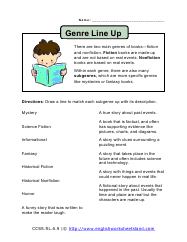Genres Worksheets To Print:
Main Two Genres - Label each book as fiction and nonfiction. People often confuse them because of the suffix "non". Students instantly think it means not real.
Subgenres - We take it a step further and classify works as: fantasy, mystery, science fiction, historical nonfiction, or informational. Use the word bank of: Mystery, Fiction, Informational, Historical Nonfiction, Nonfiction, Science Fiction, and Fantasy.
Matching Genres - You will need to match both genres and subgenres. We are working with these genres: Mystery, Fiction, Informational, Historical Nonfiction, Nonfiction, Science Fiction, and Fantasy.
Naming Genres - This one requires evidence to make your choice. What in each description leads you to name it as fiction or nonfiction?
Genre Line Up - Another match them up. This is a different orientation, but the same basic principles apply to this worksheet.
Author Genres - What genre do you think each is? Do you think the author's goal was to inform, persuade, or entertain the reader?
Genres of Books - Underline supporting evidence for your choice, then write your answer on the line. These are books and an quick synopsis for you.
Fiction and Nonfiction - Make up a short story (2-5 sentences) that could be fiction, then make up a short story that could be nonfiction.
Persuade Me! - Write a short story where you persuade your reader what the perfect pet is. My perfect pet is an elephant. How cool would that be?
What Do You Know? - Write a short story where you inform your reader about something you know a lot about. Some ideas could include bugs, your pet, or how to do something.
Informing Readers - Get the readers thoughts with these works. Some ideas could include bugs, your pet, or how to do something.
Short Stories - Write a short story where you entertain your reader. Remember to focus on the genre you are writing for.
Short Poems - Write your own short poem. Make sure the words at the end of each line rhyme! Make it fun for the reader.
Genres - Brainstorm at least three important events in your life. What category would this fall under? Next, write a short autobiography, or a story about these important events.
Biographies - Interview a parent, grandparent, or other adult you know. See if you can learn something you didn't know about them.
Genres of Literature Worksheets:
Adventure - This is the form of literature that leads our main character through a series of epic events.
Autobiography - These are self written life stories. We learn how to craft them for ourselves.
Comedy - These works are created to entertain the audience.
Essay - These are opinionated compositions that provide critiques and personal impressions of all different types of subjects.
Fantasy - The stories of magical worlds that help take us out of our own worlds for a short time.
Folklore - Filled with narratives that have shared life advice that is past down from generation to generation.
Horror - These are types of stories that purposefully shock the readers by design.
Legend - These are narratives that are loosely based on historical facts.
Mystery - This genre often lends itself to being centered around a crime. They have a solid level of suspense built in.
Mythology - This form of literature was used to explain natural phenomena.
Quest - This also lends itself to a romantic narrative. Many well known stories fit into this category.
Romance - As culture shifts, so does this form of literature, a great deal.
Science Fiction - I find that these types of stories often engage students at a higher rate then others.
Tall Tales - These stories contain highly exaggerated events or elements.
Thriller - This is a fictional work that creates a great deal of suspense and anxiety for the audience.
Urban Legend - These are modern forms of folklore.
Get FREE English Worksheets In Your Email

